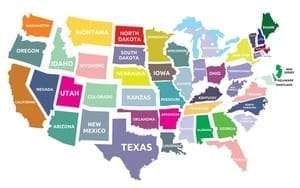
Today we begin an overview of the kinds of state laws that regulate asbestos in the U.S. Since state asbestos laws supplement federal laws, it is noteworthy that in the current political climate, federal laws, regulations, protections and government agency responsibility for asbestos safety and control could weaken.
A bill is pending in Congress to eliminate the U.S. Environmental Protection Agency or EPA, the main federal agency charged with environmental asbestos protection. While this bill is not likely to pass, the current administration is nevertheless advocating for massive agency budget cuts and overall deregulation.
If the federal government backs off on the asbestos protections it provides, states may respond by toughening their own asbestos safety laws. Our firm will monitor these potential changes and keep you informed.
In the meantime, a quick look at federal law introduces the context for state asbestos laws.
Federal Asbestos Framework Impacts State Legislation
As we have discussed, U.S. law does not impose a total ban on asbestos, although it is banned in several key products. One of our previous pieces explains this in more detail.
In December, the EPA under a new law named asbestos one of the first 10 substances that will be studied for its harm to health and the environment.
The agency has three years to evaluate asbestos for “unreasonable risk” and then two more years to address reducing that risk.
Major federal laws regulate asbestos in schools and certain other buildings, manufacturing, air pollution, water safety, hazardous waste identification and cleanup, worker protection and construction standards.
Along with the EPA, these federal agencies regulate, enforce and carry out federal asbestos safety laws: Occupational Safety and Health Administration or OSHA, Mine Safety and Health Administration or MSHA, and the Consumer Product Safety Commission or CPSC.
OSHA-Plan States
One major area of law that about half of the states have legislated is the choice to administer on a state level work-safety legislation called the Occupational Safety and Health Act, which includes asbestos protections for workers.
The federal protections are enforced by OSHA unless a state takes on the task, in which case its plan is an OSHA-approved state plan. OSHA-plan states, which include California, Utah, Oregon and Washington, must enact safety laws that are at least as tough as the federal Act, but may be stricter, including those regulating asbestos.
We will continue this discussion in future Part II of this blog.














